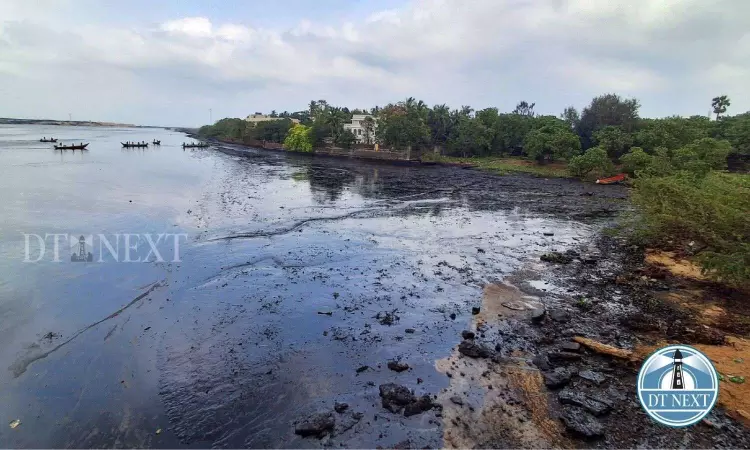
In a landmark action aimed at safeguarding the environment, the Tamil Nadu Pollution Control Board (TNPCB) has issued a strict notice to Chennai Petroleum Corp concerning the recent Ennore Creek oil spill. The regulatory body has mandated that the company pay a penalty of Rs 74 crore within 15 days, failing which it faces stringent legal consequences. This decisive action, with the fine fixed at Rs 73.68 crore, highlights TNPCB’s uncompromising stance on environmental accountability and its commitment to rectifying industrial damages.
Details of the Penalty and Its Rationale
The Ennore Creek oil spill has raised significant environmental concerns in the region, prompting TNPCB to act swiftly. The penalty, amounting to Rs 74 crore, has been imposed after thorough investigations into the spill’s impact on the local ecosystem and public health.
Environmental Impact: The oil spill has adversely affected marine life and contaminated water sources in the Ennore Creek area, raising alarms among environmentalists and local communities.
Strict Compliance Measures: TNPCB’s decision underscores the importance of strict compliance with environmental norms. By imposing such a hefty fine, the board aims to deter future negligence and ensure that companies adhere to environmental safety protocols.
Financial Accountability: The penalty of Rs 74 crore is intended to cover the costs associated with remediation, restoration, and compensation for environmental damage. This measure serves as both a punitive and corrective tool to prevent similar incidents in the future.
TNPCB’s Stance on Industrial Pollution
The TNPCB has been at the forefront of enforcing environmental regulations across Tamil Nadu. In this case, the board’s firm action against Chennai Petroleum Corp sends a clear message to all industrial players that environmental violations will not be tolerated.
Enforcement of Standards: TNPCB’s aggressive approach in handling the Ennore Creek oil spill case reflects its broader commitment to upholding environmental standards and ensuring that polluters are held accountable.
Legal and Regulatory Framework: The notice, with a specified deadline of 15 days, is part of a rigorous legal process aimed at enforcing compliance. Failure to meet the deadline will result in further legal actions, reinforcing the board’s determination to protect natural resources.
Industry Impact: This case serves as a wake-up call for the entire industrial sector in Tamil Nadu. It emphasizes the need for proactive measures, regular maintenance, and adherence to safety protocols to prevent environmental disasters.
Response from Chennai Petroleum Corp and the Local Community
While TNPCB has taken a decisive step, the response from Chennai Petroleum Corp and local communities remains closely watched. The company is expected to review its internal processes and collaborate with regulatory authorities to address the damages caused by the spill.
Corporate Accountability: Industry experts suggest that this penalty could prompt Chennai Petroleum Corp to invest in better preventive measures, ensuring that similar incidents are avoided in the future.
Community Concerns: Local residents and environmental activists have been vocal about the need for stringent action to protect the ecological balance of the Ennore Creek area. They welcome TNPCB’s decision as a positive step towards restoring the environmental health of the region.
Future Implications: The outcome of this case may set a precedent for how environmental violations are penalized across the country. It is expected to influence future regulatory policies and encourage industries to adopt more sustainable practices.
Broader Context: Environmental Accountability in India
This incident is part of a larger narrative of environmental enforcement in India. As industrial activities expand, ensuring that environmental regulations keep pace is crucial for sustainable development.
Regulatory Reforms: The TNPCB’s actions reflect ongoing efforts to strengthen regulatory frameworks and ensure that industrial growth does not come at the cost of environmental degradation.
Economic and Social Balance: By imposing substantial penalties on violators, regulatory bodies aim to balance economic growth with ecological preservation, ensuring long-term benefits for both industry and society.
Incentivizing Green Practices: Such measures are also expected to incentivize companies to adopt greener technologies and more rigorous safety protocols, paving the way for a more sustainable industrial future.
Conclusion: A Critical Step Toward Environmental Restoration
The issuance of a Rs 74 crore penalty to Chennai Petroleum Corp by TNPCB marks a significant milestone in the enforcement of environmental regulations in Tamil Nadu. The action, aimed at mitigating the adverse effects of the Ennore Creek oil spill, sends a resounding message about the importance of corporate accountability and proactive environmental stewardship. As authorities work to restore the affected area, this case serves as a crucial reminder of the ongoing need for vigilant environmental protection and robust regulatory oversight.










